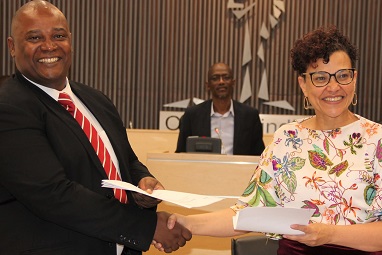
Namibia Ocean Cluster advances sustainable fisheries with landmark inking ceremony

The Namibia Ocean Cluster witnessed a significant milestone this week as the six founding members, along with three associate founding members, formally committed to minimizing waste and maximizing socio-economic value from the fish harvested in the local fisheries sector.
The signing ceremony on Wednesday marked a crucial stage in the Cluster’s journey to becoming a registered non-profit in Namibia, expected to be formalized in early February.
The Founding Members comprise leading Marine Stewardship Council (MSC) certified hake fishing companies, including Embwinda, Hangana, Merlus, Novanam, Pereira, and Seawork. On the non-fishing front, the Associate Founding Members include the Fisheries Observers Agency, Namibia Nature Foundation, and Sam Nujoma Campus – University of Namibia. These nine entities represent a broader coalition that has actively supported the development and innovation activities of the Ocean Cluster over the past three years.
The Namibia Ocean Cluster, buoyed by the support of the World Economic Forum’s Ocean Action Agenda, emerges as a collaborative platform designed to unite the seafood sector and allied stakeholders. Its mission is to optimize the utilization of all seafood harvested, promoting innovation, research, and markets for fisheries by-products while enhancing socio-economic benefits. The initiative aligns with the global ‘100% fish’ movement, initiated in Iceland and extending to regions such as Alaska, New England, and Denmark.
While the current focus of the Cluster revolves around the hake industry, its inclusive approach invites all fisheries in Namibia to participate. The hope is that diverse seafood companies will join forces to collaborate on future by-product utilization projects. Associate Members possessing relevant expertise are also encouraged to contribute to the Cluster’s objectives.
Addressing the issue of seafood loss, the United Nations Food and Agriculture Organization (UN FAO) reports that up to one-third of seafood is lost. Reducing this loss aligns with the Sustainable Development Goal target 12.3, aiming to halve food loss and waste by 2030. Shifting towards circular economic models in the industry is anticipated to result in increased food production, nutrition security, local employment, and more efficient use of marine resources, contributing to global environmental and social goals.
The Iceland Ocean Cluster, a leader in the 100% fish movement, has been a staunch supporter of the Namibia Ocean Cluster, providing guidance in its development and sharing insights on 100% fish utilization. Namibia now joins a growing global family of Clusters dedicated to minimizing seafood loss and waste, marking the first African chapter in this movement.
The project, funded by the UK DEFRA’s Blue Planet Fund, aims to protect and enhance the marine environment, and reduce poverty and is led by the UK’s Foreign, Commonwealth, and Development Office along with the UK Department for Environment, Food, and Rural Affairs. This initiative will be showcased at the United Nations Ocean Decade Conference in April, participating in discussions on seafood loss and waste solutions.
The work undertaken by the Namibia Ocean Cluster presents a replicable model for other regions and fisheries globally. Reports detailing the process used to develop the Cluster and explore by-product opportunities are available for groups interested in investigating seafood circularity in their specific contexts.
As the Namibia Ocean Cluster progresses towards legal non-profit status, it signifies a collaborative commitment towards sustainable fisheries and responsible resource utilization.
“The Cluster had been three years in development. With founding members from industry and associate founding members from expert groups, our collective intent is to create a safe, pre-competitive forum where we can collaborate to maximize utilization of all fish harvested from Namibian fisheries, whilst enhancing socio-economic benefit,”Chair of the Namibia Ocean Cluster Pierre le Roux said.
He emphasized the collaborative nature of the Namibia Ocean Cluster, describing it as a “safe, pre-competitive forum” where industry players and expert groups could join forces to maximize the utilization of fish resources while ensuring socio-economic benefits for the community.
Acknowledging Matti Amukwa, Chair of the Confederation of Namibian Fishing Associations, Le Roux stated the intention to grow Cluster membership with like-minded individuals who share the vision of sustainable fishing practices.
Le Roux meanwhile welcomed senior management from the founding members, which included major hake sector operators such as Embwinda, Hangana, Merlus, NovaNam, Pereira, and Seawork. He also introduced Directors of the Namibia Ocean Cluster, along with their Deputies, highlighting their roles in ensuring the Cluster’s legal entity status as a non-profit organization.













































